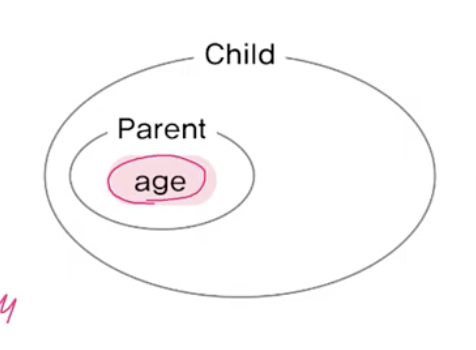상속(Inheritance)
- 기존의 클래스로 새로운 클래스를 작성하는 것.(코드의 재사용)
- 두 클래스를 부모와 자식으로 관계를 맺어주는 것.
- 자손은 조상(부모, 부모의 부모 등)의 모든 멤버를 상속받는다.(생성자, 초기화 블럭 제외)
- 자손의 멤버 개수는 조상보다 적을 수 없다.(같거나 많다.)
- 자손의 변경은 조상에 영향을 미치지 않는다.
class 자식클래스 extends 부모클래스{
// ...
}
class Parent { }
class Child extends Parent {
// ...
}
public class EX7_1 {
public static void main(String[] args) {
Tv tv = new Tv();
tv.channel = 10;
tv.channelDown();
System.out.println(tv.channel);
SmartTv stv = new SmartTv();
stv.channel = 10;
stv.channelUp();
System.out.println(stv.channel);
stv.caption = true;
stv.displayCaption("안녕하세요");
}
}
class Tv{
boolean power;
int channel;
void power(){
power = !power;
}
void channelUp(){
++channel;
}
void channelDown(){
--channel;
}
}
class SmartTv extends Tv{
boolean caption;
void displayCaption(String text){
if(caption){
System.out.println(text);
}
}
}단일 상속(Single Inheritance)
-
Java는 단일 상속만을 허용한다.(C++은 다중 상속을 허용함)
class TvDVD extends Tv, DVD{ // error : 조상은 하나만 허용
// ...
} -
인터페이스를 이용하면 클래스 간 충돌을 방지하면서 다중 상속과 같은 효과를 낼 수 있다.
-
인터페이스를 이용하지 않고 다중 상속의 효과를 내는 방법
- 비중이 높은 클래스 하나만 상속관계로, 나머지는 포함관계로 한다.
class MyTv{
boolean power;
int channel;
void power(){power = !power;}
void channelUp(){ ++channel;}
void channelDown(){ --channel;}
}
class DVD{
boolean power;
void power(){power = !power;}
void play(){/* 내용 생략 */}
void stop(){/* 내용 생략 */}
void rew(){/* 내용 생략 */}
void ff(){/* 내용 생략 */}
}
class TvDVD extends Tv{
DVD dvd = new DVD();
void play(){ // 껍데기를 만들어주어 인스턴스 레벨에서 바로 사용할 수 있게 한다.
dvd.play();
}
void stop(){
dvd.stop();
}
void rew(){
dvd.rew();
}
void ff(){
dvd.ff();
}
} Object 클래스 - 모든 클래스의 조상
- 부모가 없는 클래스는 자동적으로 Object 클래스를 상속받게 된다.(컴파일러가 자동으로 추가함)
- 따라서 모든 클래스는 Object 클래스에 정의된 11개의 메서드를 상속받는다.
- toString(), equals(Object obj), hashCode(), ...
